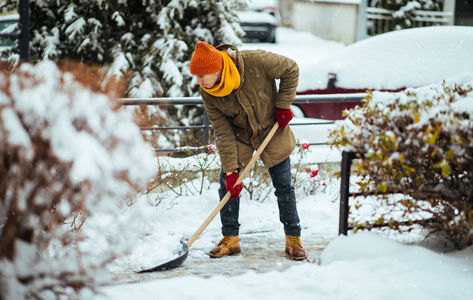Winter mishaps can be hard to avoid. Although older folks, outdoor workers, and those with chronic health issues are most at risk, anyone can land in the emergency department after a slip or a fall. Atlantic Health System emergency medicine physician Christopher Lobaito, MD, explains the kinds of injuries that are showing up in hospital emergency departments, and offers some tips to safely navigate the deep freeze.
“Everyone can be seriously impacted by the cold,” says Dr. Lobaito. “People with chronic underlying heart and lung disease can be at increased risk of complications. For some people, especially those with cardiovascular disease, exertion from shoveling in the cold can cause a heart attack. Falls are common regardless of age, and any of us can break a wrist or ankle from just one misstep. Frostbite is also possible from prolonged exposure, as is frost ‘nip’, which is much less serious.”
Here are a few tips to keep you and your family out of the emergency department this winter.
Walking
- Wear appropriate footwear with good traction.
- Take small steps with a wider stance for better balance.
- Use handrails on outdoor stairs for stability.
- Clear ice and snow promptly to prevent slips and falls.
- Enter and exit buildings cautiously as floors may be wet and slippery.
Shoveling
- Use a lightweight shovel to reduce strain on your back and shoulders.
- Push snow instead of lifting it when possible and use proper lifting techniques.
- Avoid overexertion by staying hydrated and taking breaks.
- Spread salt or sand on walkways to reduce ice formation.
Driving
- When driving on icy roads, leave extra space between vehicles.
- Test road surfaces to know how your car handles.
- Make sure your gas tank and fluids are full.
- Stay home and off the roads whenever possible.
Dressing
- Dress in layers to stay warm with moisture-wicking materials to keep dry.
- Wear a hat and gloves to protect extremities from cold temperatures.
- Use reflective clothing or accessories in the dark to enhance visibility.
“Shoveling six to eight inches of snow can put as much stress on your heart as a stress test or running on a treadmill.” says Dr. Lobaito. “And, if you think using your snowblower is a better option, be careful of that, too. Even when a snowblower is turned off, the blade can still turn enough to cause serious damage, so don’t put your hand inside. If it’s jammed, use a broom handle.”
Dr. Lobaito says we’re all in this together, so the best way to prevent injuries is to limit outdoor time, check on your neighbors periodically, always dress in layers, and ask for help when you need it.
“Extreme cold is tough on all of us — and not just outside. Pipes freeze, heaters break, power goes out, and accidents happen, so it doesn’t hurt to keep emergency supplies like blankets, flashlights, and non-perishable foods on hand — just in case.”
Be Proactive About Your Health
To stay safe and healthy, it's good to have a primary care provider who knows and understands your health history and wellness goals.











